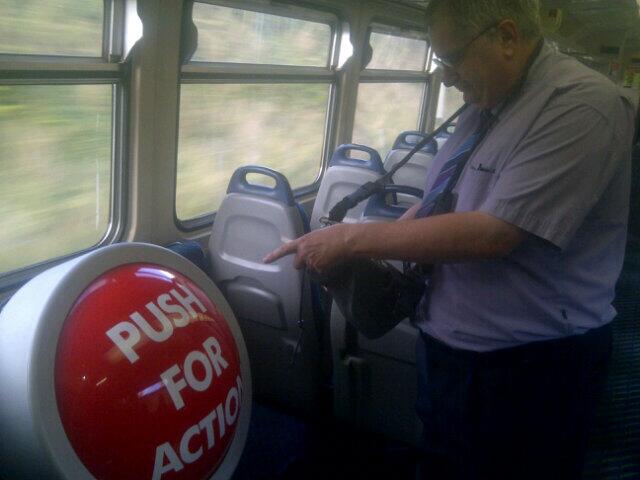On Tuesday 15th October NAS ambassador Sam Mukherjee, accompanied by her brother Indi, spoke at our parliamentary reception for Push for Action. Read the full transcript of her moving speech, below.
"My name is Sam; I am a research psychologist and the proud sister of an
amazing individual. My little (big!) brother is Indi, he is 18 and we are just
about managing to keep our heads abreast. Indi was diagnosed with severe autism
and learning difficulties at 2.5 years. We knew something was askew when he
didn't reach his childhood milestones, he was reticent and found it extremely
difficult to engage with everyone around him. I can only imagine how isolated he
must have felt. The diagnosis was the first step towards the right direction for
Indi as well as the rest of the family. However, it's an ongoing battle.
"
 Indi uses very simple Makaton (which is a sign language), gestures,
pictures and has a limited vocabulary to communicate how he feels. He
navigates society and its social structure via a series of simple and
finite guides, timetables and social stories. The world is incredibly
difficult to orientate himself to and hence exceedingly difficult to navigate.
He is an incredibly polite, loving, astute, caring and emotionally aware
individual. But the rigid thinking structures, limited social skills and
communication defer him from living what you and I would call a neurotypical
life.
Indi uses very simple Makaton (which is a sign language), gestures,
pictures and has a limited vocabulary to communicate how he feels. He
navigates society and its social structure via a series of simple and
finite guides, timetables and social stories. The world is incredibly
difficult to orientate himself to and hence exceedingly difficult to navigate.
He is an incredibly polite, loving, astute, caring and emotionally aware
individual. But the rigid thinking structures, limited social skills and
communication defer him from living what you and I would call a neurotypical
life.
"It's been incredibly difficult to get the support he needs. We are in
austere times and that has made it even harder to find support. Indi goes to a
specialist school in his borough for children and young people with a learning disability. However,
his SEN statement lasts until 19. Post 19 education is extremely difficult to
navigate as placements are dependent on funding. There are very few specialist
services available to help young people like my brother. He needs appropriate
independent living or life skills. I want him to achieve his fullest - as much
independence and self sufficiency as possible. If that means he can make his own
cup of tea, without any prompts or verbal suggestions then that is
fantastic.
"His extremely trusting nature and lack of communication skills make him
incredibly vulnerable. And of course we are not the only family that has had to
go through endless meetings to get even the most basic of supports. Last year
was extremely turbulent as Indi went through and is still going through
transition- that is moving from children's to adult services. We have just
started respite for him - so he goes away twice a month for an overnight stay.
That gives him and us a much needed reprieve. We have had to deal with school
site movement- which led to a complete breakdown for Indi; lack of care or
support providers and uncertainty about Indi retaining his school placement. So
that's worrying about education, health and social services all at the same
time.
"Don't get me wrong, we have moments of exceeding highs and triumphs but they
are mixed with a continuing inertia of lows. Having access to adequate and much
needed support services is a constant issue and a constant battle. Add to that
Indi is whom we see to have substantial needs. I can only imagine how much more
difficult it is for those on the moderate to mild scale on autism.
"Currently, efforts are being made to implement the strategy in my borough
and I am trying to aid in that but in austere times when everyone is fighting
for the same thing- which is essentially more support, I feel that those who are
least vocal will get left behind. That means people like my brother who don't
have a voice to begin with and are unable to highlight their plight. I am here
today to urge you that please don't forget them. Please remember the vulnerable
who need our support the most."

